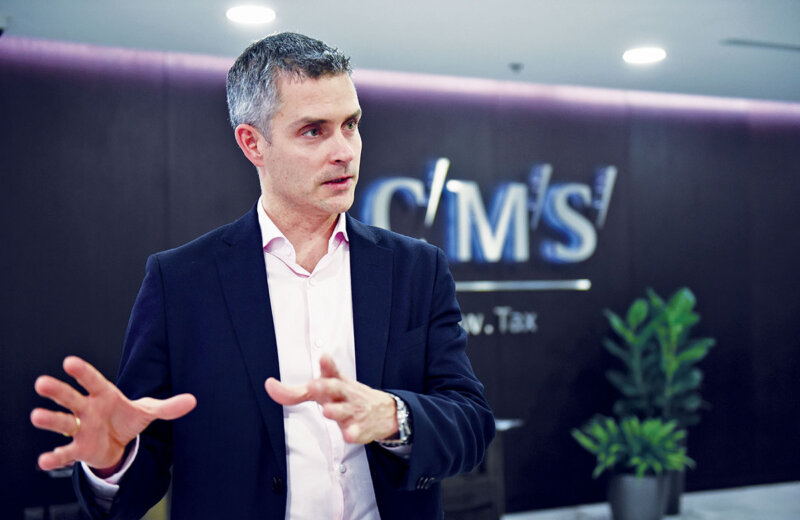Graham Conlon, managing partner at CMS Cameron McKenna Nabarro Olswang’s Ukraine branch, stresses that the major assets of his firm are the people and that it’s most important to make sure the work environment is at its best.
“We invest into our lawyers to make them as sharp as they can be when it comes to advising clients,” Conlon told the Kyiv Post at his office on Volodymyrska Street.
To do this the firm invests through various ways into its human capital. For example, young lawyers are mentored by experienced lawyers, while the more experienced specialists attend regional seminars in European capitals.
Conlon says this is essential since professionals fresh out of university will only know the theoretical part of law, whereas applying law is a completely different story.
Advising clients “can only be learned on the job through communicating” and by learning from more experienced professionals, Conlon – who has been in the business for almost 16 years – says.
And this brings results.
“During the last three years we have been extremely busy,” Conlon says.
And there has also been a shift in the nature of client work. About 1.5 years ago the firm used to be busy helping businesses leave the country. Now it’s the other way around.
“(But) after that we have been extremely busy helping people come to Ukraine,” he says.
Recent projects
For example, his firm assisted MV Cargo, a grain storage company, in a joint venture with the U.S. agriculture giant Cargill. It also assisted SD Capital, a private equity firm, in its joint venture with P&O Maritime, a port company which is a subsidiary of DP World, one of the world’s largest port operators.
Other projects involved Norwegian alternative energy company Scatec Solar and sports equipment manufacturer HEAD N.V. to launch their activities in Ukraine.
Ukraine’s biggest attraction for potential investors, Conlon says, is that the country has massive potential because it is still a developing market economy.
This is different from his native England, as it is a mature economy and it is hard to make good returns there, as “they have been already made by people before.”
Even compared to Poland, Ukraine offers great potential returns on investments, Conlon says.
Corruption response
But this also requires a quick response to Ukraine’s endemic corruption in all of its sectors of economy.
For instance, take the banking sector.
Currently the trust in Ukraine’s banking sector is quite low as at least $20 billion have been stolen through various schemes and pocket banks throughout the past years.
That trust can be rebuilt, but the country needs to uproot corruption, Conlon says. This phenomenon develops from the top government leadership downwards affecting each part of society.
“And the banks are no (exception),” Conlon says. If there is corruption in the country, it is also there in the banks.
And over 90 Ukrainian banks were shut down because of non-transparency during the past 3 years. And this lack of transparency still dominates in Ukraine economy.
“Currently we have the atmosphere of general acceptance of corruption in Ukraine,” the British lawyer says. “Everybody is doing it.”
Conlon’s solution is to offer incentives for businesses to be transparent and fight corruption. Then the situation will change throughout society both in state-run organizations and in private businesses. The important thing is to “get into the right direction” as it will be a sign for foreign investors to enter the country.
Had Conlon been Ukraine’s finance minister for a single day, he “would set up a meaningful forum for trying corruption and enforcing anticorruption.”
For example, establishing a functioning truly independent anti-corruption court is a good start.
So far his leadership has been bringing success to his firm.
There are several reasons that explain the firm’s financial growth in Ukraine. One reason is simply because Ukraine’s economy is doing better than it has been three years ago. It is also due to some “reforms made in the country.” He also attributes it to the vertical structure within the firm which “contributes to our growth too.”
But all this is built on the basis of “putting the interests of our clients first in our work.” For example, he assigns teams on specific projects “only after taking due care and understanding of the client’s interests.”
His team tends to work on projects from the beginning to the very end instead of doing parts that would be sent to another team. “The projects last months and sometimes years,” which he says, explains why his firm releases so few press release statements.
The local firms “will do small aspects of work, sometimes those connected with Ukrainian law aspects of a larger transaction, and issue a release.” Hence domestic firms are more noticeable in the media.
The London-headquartered law firm has more than 1,000 partners, 4,500 lawyers and is present in 41 countries with 73 offices.
Conlon would not to disclose the revenue of the Kyiv office due to confidentiality, but says that the global firm’s revenue was at around one billion euros last year. A fraction of this amount was made in Ukraine.
Conlon says that his firm typically pays its employees more than the average local salaries, making them competitive on the market.
But Conlon and his management team “know that salary is not the only aspect that people appreciate.” For example, lawyers can work from home as long as the work is done on time and according to the firm’s standards.



